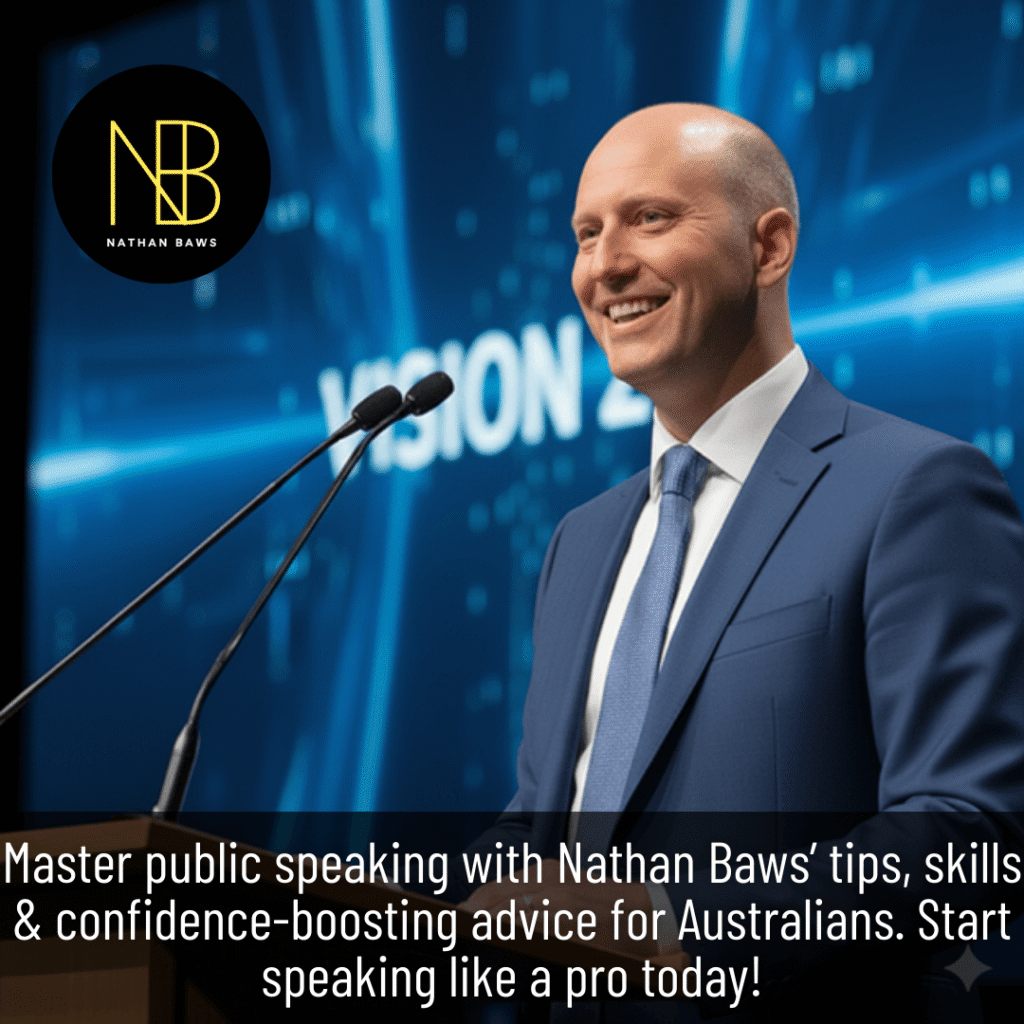Introduction
Nervous about speaking in public? You’re not alone. In fact, surveys show most people rate it as one of their top fears right up there with spiders and tax audits.
But here’s the good news – public speaking is a skill you can learn. You don’t have to be born with a booming voice or natural stage presence. Bit by bit, with the right techniques and some practice, you can go from avoiding the microphone to speaking with confidence.
I’m Nathan Baws. I speak at events all over Australia – in Perth boardrooms, Melbourne community halls, even over Zoom calls with teams in the outback. This guide will give you a simple roadmap: what public speaking is, why it matters, and some tips to help your next talk land with your audience.
Let’s get into it.
What Public Speaking Is All About
Speaking in public is more than just standing in front of a group and saying words.
Public speaking isn’t just talking-it’s the key to getting your thoughts out of your head and into someone else’s. When you learn to speak clearly, with a bit of fire in your voice, you can connect with people in ways that stick.
Whether it’s a 10-minute presentation at work or a keynote at a conference, the goal is the same: to get your message across in a way people actually remember.
What are public speaking topics
I used to think picking a topic for a speech was about finding something “impressive,” but I’ve learned it’s really about what lights you up and resonates with the people listening. A topic can be anything-literally any idea you want to share.
There’s no “perfect” topic. What matters is how well it connects with your audience and whether it sparks interest or inspires action.
Here are some great options for presentation topics:
- Stories from your life – Sharing a lesson you learned the hard way, like a time you failed and bounced back, feels real and pulls people in because they see themselves in it.
- Work-related ideas – If you’re in a meeting or pitching a project, talking about your team’s goals or a new strategy can hit the mark. I once gave a presentation on a budget plan that got everyone nodding because it was clear and tied to their concerns.
- Inspiring messages – These are the talks that get people fired up, like sharing why you believe in chasing dreams or rethinking failure. They’re great for sparking change.
- Breaking down complex stuff – If you’re explaining something tricky, like how a new tool works or what data means, making it simple for everyone is a win.
The best topic is the one that feels personal to you.
How public speaking is done
Public speaking used to make my stomach churn, but I’ve learned it’s just about being yourself and following a few steps that actually work.
- Know what you’re driving at – Before you say a word, figure out the one thing you want people to carry with them when they leave. Jot it down and let it be your guidepost. That keeps you from wandering off into a mess of ideas that don’t connect.
- Make it feel like a story – People don’t want a dry lecture. Start with something that wakes them up-maybe a question that gets them thinking, a fact that makes them blink, or a quick glimpse into a moment from your life. Then lay out your points clearly and Finish with something that hits home, a final thought that sticks.
- Show up with confidence – It’s not just what you say-it’s how you come across. Stand like you’re rooted to the ground, look people in the eye, and let your voice ring out clear. If you pause now and then, it’s like giving your words room to breathe, and people will lean in to listen.
Here’s the truth: you’ve got to practice until it feels like second nature.
Where public speaking is done usually
I used to think public speaking was for grand stages, but it’s everywhere ideas are shared. I’ve pitched plans in cramped office rooms, my voice shaky but convincing. I’ve spoken at community centers, rallying neighbors for a cause. I’ve led Zoom calls from home, guiding a team despite spotty Wi-Fi. Conferences, schools, even weddings-giving a toast-or small parent meetings where I spoke up, all count. Book clubs, church groups, even team huddles are chances to practice. Every time, I’ve gotten better at steadying my nerves and connecting.
Can public speaking be a hobby
Absolutely – public speaking can be a fun and fulfilling hobby. Many Australians join Toastmasters clubs, community debate teams, or storytelling nights just to practise in a friendly, low-pressure environment. Over time, your confidence grows, and soon speaking in front of strangers can feel as natural as talking to mates at the pub.
Why Public Speaking Is Important
Public speaking isn’t just for politicians, influencers, or corporate executives. It’s a skill that opens doors – personally and professionally. The importance of public speaking skills cannot be overstated: it helps you express yourself clearly, earn trust, and influence people in positive ways.
Why public speaking matters today
In today’s world full of distractions – phones buzzing, social media feeds updating every second – being able to deliver a clear message is a superpower. People notice when someone can cut through the noise and hold attention.
This is why presentation skills matter in 2025 more than ever. Whether online or in person, being heard and understood can set you apart from the competition.
How public speaking boost your confidence
Confidence is built by doing. Every time you speak – at a small team meeting or a conference in, you prove to yourself that you can handle it.
The more you do it, the more natural it feels. Soon, the shaky hands and racing heartbeat turn into excitement and presence. You stop worrying about “getting through it” and start enjoying the connection with your audience.
Why public speaking is an art
Public speaking is an art form. It combines creativity, emotion, and structure to turn ordinary words into something memorable.
Think of it like painting – your words are brushstrokes that create a mental picture for your audience. When done well, they don’t just hear your message; they feel it. They leave remembering how you made them think, laugh, or even take action. That’s the power of the art of speaking.

Skills You Need to Master
Great public speakers aren’t just born that way – they build key skills over time.
What public speaking skills do you need
If you want to get better at speaking in public, there are a handful of skills that really make a difference.
- Clarity – Say what you mean in plain words. You don’t have to sound fancy. Slow down if you tend to rush – people need time to take it in.
- Storytelling – Turn your points into little stories. People are more likely to remember something with a beginning, middle, and end than a list of random facts.
- Body language – How you stand matters. Don’t fold your arms or hide behind notes. Look around the room, move a little, and use your hands naturally.
- Audience involvement – Get the room involved somehow. Ask for a quick show of hands or throw in a question. It keeps people from zoning out.
- Timing – Keep an eye on the clock. End while people are still paying attention instead of dragging it out until they switch off.
With enough practice, all of this starts to come together on its own. You’ll sound clearer, your stories will flow better, and your body language won’t feel forced.
Why public speaking skills are important
These skills make you a better communicator, help you build trust, and position you as a leader. People are more likely to respect and follow someone who can speak clearly and confidently, whether in a workplace or at a community event.
What are the 5 pillars of public speaking
When people talk about public speaking, they often mention five main “pillars.” Think of them like the legs of a table – miss one and the whole thing wobbles.
- Clarity – Keep things simple. If your audience has to work too hard to understand, you’ll lose them. I like using short sentences and cutting out the fancy words.
- Confidence – You don’t have to feel fearless, but you do need to look like you belong up there. Standing tall, breathing properly, and starting strong tricks your brain (and the audience) into thinking you’ve got this.
- Connection – Ever sat through a talk that felt cold and distant? A quick story or bit of humour warms the room and makes people lean in.
- Structure – Talks without a clear order can feel like a late-night ramble. A start, a middle, and an end helps everyone keep up.
- Engagement – Don’t just talk at people. Ask a question, pause to let them react, even smile – anything that makes them part of it.
Put all five together and you get a speech people actually want to hear.
Tips to Improve Your Speaking
Tips when public speaking
- Prepare thoroughly – Go over what you want to say until you can talk about it without looking at notes too much. The more you know it, the less nervous you’ll feel when you stand up there.
- Know your audience – People can spot fake a mile away. Keep it real, keep it simple, and think about what they’d actually care about hearing.
- Use visuals wisely – A few simple slides are plenty. People came to listen to you, not to read your screen.
- Breathe deeply – Take a slow breath in and out before you start. It’s such a small thing but it makes you feel steady and stops you from rushing.
- Engage early – Start with a quick story, a little joke, or a question to get people leaning in. It makes the room feel warmer straight away.
Public speaking feels scary at first, but these little steps take the edge off.
What to do when public speaking
- Make eye contact with different sections of the room. This helps everyone feel included and keeps them engaged. Move your gaze naturally from left to right so no one feels left out, and avoid staring at one person or your notes for too long.
- Pace yourself and pause occasionally to let points sink in. Speaking too quickly can make you sound nervous and confuse the audience. A well-timed pause lets listeners absorb what you just said and gives you a moment to breathe and think about your next line.
- Test your tech before an online talk so nothing derails you. Whether it’s a microphone, slides, or Zoom connection, a quick check can save you from awkward delays. Familiarise yourself with mute buttons, screen sharing, and any tools you’ll use so you stay in control.
- Always have a backup plan if something goes wrong – you’ll look calm and prepared. This might mean printing notes, saving slides offline, or having an alternate activity if tech fails. Audiences are forgiving if you handle hiccups with confidence and a smile.
Doing these small things during your talk shows professionalism and builds trust with your audience.
When public speaking:
Arrive early, check the space, walk the stage if you have one, and get comfortable. Time your talk so you don’t run over. Most importantly, channel any nerves into enthusiasm – the audience will feel your energy.
Should You Take a Public Speaking Course?
Are public speaking classes worth it
Yes – they’re worth every bit of time and effort. Classes give you structure, a safe environment to practise, and feedback that helps you improve faster. Even a short course can transform your confidence and make speaking in public feel far less intimidating.
Are public speaking courses worth it
Definitely. A good course is like training wheels – it gives you guidance, encouragement, and hands-on practice. Over time, you’ll notice your voice becoming clearer, your nerves settling, and your audience responding more positively.
Conclusion: Get Nathan Baws to Speak at Your Event
Public speaking isn’t just a skill – it’s a game-changer. It can open doors, boost confidence, and make your event unforgettable.
Imagine your audience leaning forward, nodding along, laughing at the right moments, and walking away inspired. That’s the power of a well-delivered talk – and that’s exactly what Nathan Baws brings to the stage.
Reach out at https://nathanbaws.com/ and book him for your next event. at a time and you’ll get better fast.
FAQs
What is public speaking in simple words
Public speaking is just talking to a group about something that matters to you. It could be teaching, persuading, or simply sharing a story from your own experience. Public speaking is really about creating a connection with your listeners and helping them take away something valuable.
Why is public speaking important today
Public speaking helps you build trust, lead teams, and share ideas that matter. It’s also a major career booster since people notice and remember good communicators. Even in your personal life, being a strong speaker helps you have better conversations and build stronger relationships.
What are the top public speaking skills I should learn
Speak clearly so people can follow you without straining.
Tell stories because they are more memorable than raw facts and keep people hooked.
Engage your audience by asking questions or inviting interaction so they stay involved.
Work on your confidence – even standing straight or smiling can make a big difference.
Focus on timing, body language, and tone so your delivery feels polished and professional.
How do I get rid of nerves before speaking
Feeling nervous is completely normal – even experienced speakers get butterflies. Take a few deep, slow breaths before you begin to calm your mind and body. Starting with smaller groups helps you build confidence step by step. Visualising yourself speaking successfully can also reduce fear and make the moment feel less intimidating.
What should I avoid while speaking in public
Don’t rush through your words – give people time to process what you’re saying. Avoid reading everything directly from your notes because it disconnects you from the audience. Using overly complicated words or jargon can confuse people, so stick to clear, simple language. Avoid turning your back to the crowd for too long – face them and make eye contact.
How do I keep an audience engaged
Stories work wonders – they give listeners something to relate to and remember. Ask your audience questions or get them to participate with a quick show of hands. Use a little humour where appropriate to lighten the mood and keep energy up. Moving around the stage naturally or using gestures helps keep attention focused on you.
Are public speaking classes worth it
Yes, they can make a big difference. A good class gives you structure, so you know what to work on first. You get to practise speaking in a supportive, low-pressure environment where mistakes are welcome as part of learning. Feedback from a coach or peers helps you improve faster than working alone. Plus, you’ll meet other learners who can encourage and help in overcoming fear of public speaking.
Can I practise public speaking for free
Definitely – there are many ways to practise without paying. Toastmasters is a great option, and most local clubs welcome visitors. You can also record yourself on your phone to spot areas where you can improve. Speaking up in meetings, volunteering to give a short update, or even reading aloud to friends can build your skills.
What are common mistakes new speakers make
Many new speakers talk too fast because they just want to get it over with. Some avoid eye contact, which makes them look nervous even if they know their material. Overloading slides with text is another common issue – keep them simple and visual instead. Filler words like “um” and “like” can creep in and distract listeners. The good news is all these habits can be fixed with awareness and steady practice.
How do I measure if my speech was successful
Watch the audience while you speak – are they nodding, smiling, or taking notes? Afterward, notice if people come up to you with questions or comments – that’s a good sign they were engaged. You can also ask a trusted colleague or friend for honest feedback about how you came across. Reflect on whether you achieved your main goal – did you inform, inspire, or persuade as planned? Each speech is a chance to improve and measure progress.


